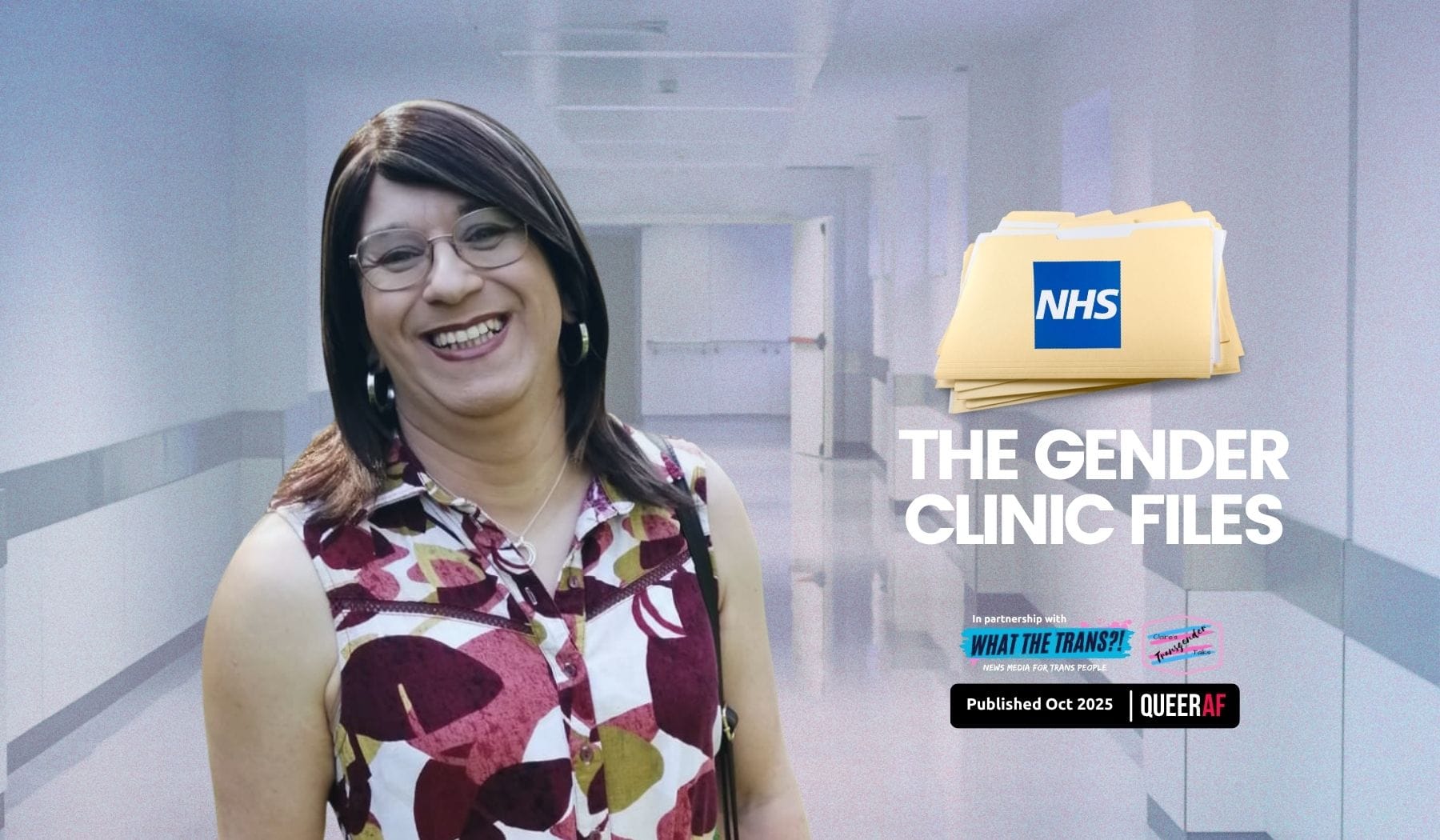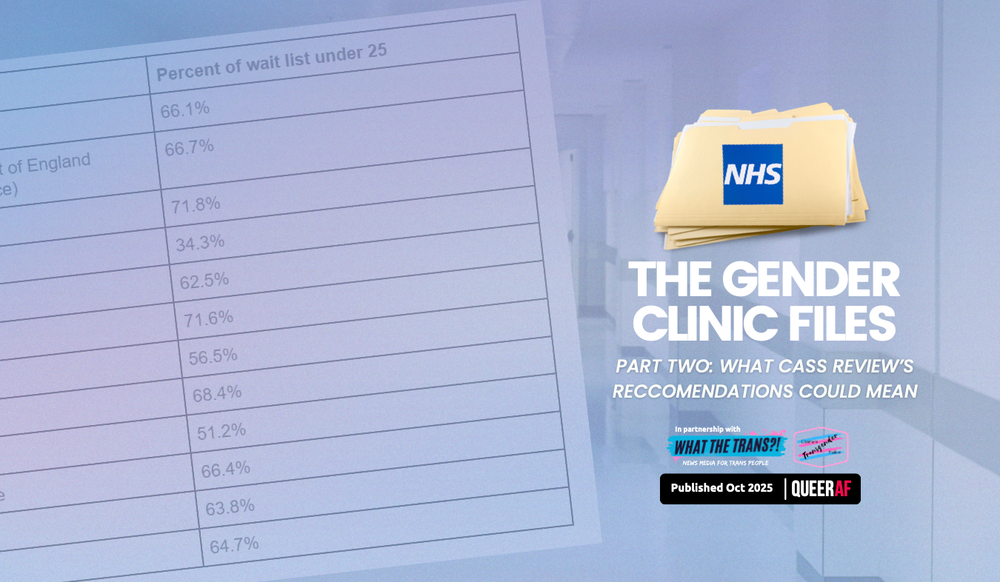
TL;DR: The Gender Clinic Files investigation, in collaboration with QueerAF, What The Trans?! and Claire’s Trans Talks, has already garnered over half a million views on our own platforms, as well as garnered media coverage in multiple outlets, demonstrating the impact that community groups and media can achieve when working together. Now, the researcher behind the series reveals the data it was built on, making it open source and handing the information over for you to use.
When I first came out as transgender at the end of 2016, the waiting time for adults at the Tavistock & Portman Gender Identity Clinic in London was around three years.
Now, their website states they are currently seeing people referred in March 2020. However, my investigation, now published with QueerAF and What The Trans?!, reveals that the wait is closer to 12 years.
It also reveals something much more critical - a country-wide picture of a structurally broken system.
In the eight years since I came out the NHS-reported waiting time for this clinic has doubled, and I’d likely still be languishing on the waiting list if I hadn't transferred to the East of England service.
The picture across the UK is a postcode lottery, and it is especially worse for rural communities. At the clinic in Exeter, they’re only just starting to see people who were referred in June 2017 – that’s an eight year wait.
The only trouble is, these NHS-reported waiting times are not an accurate reflection of the current services actually being delivered. As our investigation has shown, if referred today with no changes to the system, in Scotland some people will live their whole adult lives without ever getting care, with one clinic’s demand creating a 224-year wait.
While I was waiting to be seen, I was socially transitioning and getting established on HRT, like many of us do. I kept my eye on the discussions about waiting lists, waiting times, and service specifications, both within the Trans+ community and in political circles.
What I quickly noticed was that there was a lack of solid data in many areas around NHS trans healthcare. One of those was the reality of accessing gender services across the UK.
While there were a number of qualitative reports by LGBTQIA+ and Trans+ specific organisations that touched on these issues in the face of ever-increasing community-reported waiting times, there seemed to be nothing in relation to what the UK’s adult gender services were actually doing. Or not doing, as the case may be.
So, I thought I’d see what I could do myself.
What started as a small project examining a single clinic, just before I began working for an MP as a researcher, has now expanded into the UK Adult Gender Services Monitor.
By sending Freedom of Information requests to each gender service, I sought to find out what I could, and with the help of a very large and complex spreadsheet, I published a 52-page report on the performance of adult gender services across the UK through TransLucent in 2023.
The findings in that initial report were utterly damning, revealing many adult gender services with estimated waiting times that spanned into multiple decades, and clinicians that often only saw around one person a day on average.
It was sent to key figures in the NHS, including Dr Levy, who is currently running the Levy Review into adult gender services, as well as the relevant ministers and shadow ministers at the time, which included Wes Streeting.
Not a single one of them could be bothered to respond.
Wes Streeting’s recent claim at the NHS LGBT Conference in September that there were 42,000 people on the adult waiting list is the closest we’ve got to him acknowledging this work. He said this figure was ‘breaking his heart’.
So heartbroken that he apparently couldn’t be bothered to use the extensive powers he has at the Department of Health and Social Care and as Secretary of State for Health to determine an accurate picture of the waiting list for the services which he is responsible for. Instead, he relied on out-of-date data that appeared to come from my update last year.
Despite pre-empting our investigation with that speech, he has once again ignored press inquiries on these latest figures from my partners QueerAF and What The Trans?!
QueerAF’s interrogation of the data has shown that most Trans+ people in the UK will wait more than a third of their adult life to get their first appointment at an NHS gender clinic, and some will never receive care. They also showed that, if the Cass Review’s recommendation to change the system of Trans+ healthcare for under-25-year-olds is implemented, two-thirds of the current waiting lists for GICs could be wiped out, and the care of 32,000 people would change.
Meanwhile, on the What The Trans?! Podcast, we’ve discussed some of the findings from this date, the difficulties in obtaining it, and the effect these decades-long waits are having on our community.
As Vic Parsons set out last week in their piece asking how the system can be changed to address the issue, what we truly need is a radical rethink of approach. Despite the several new services that have been introduced, and the addition of the two other services currently in pilot phase in England, it’s clear that these will not begin to address either the size of the existing waiting list or the current demand for services. The situation is only made worse by the continuing underperformance of traditional services.
This leaves the UK Trans+ community sitting in limbo for a large portion of our lives, waiting for an unsupportive and uncaring NHS to actually rectify the structural problems in their services, problems made far worse by politically motivated interference.
In the meantime, the only intervention Wes Streeting is prepared to offer so far is a lightly funded pilot service in the southwest of England, where the current waiting time to access the Exeter service is 31 years, to provide ‘mental health support’. Some might argue that money could be better spent on improving service delivery instead.
It remains my opinion, based on the data we now have, that the only way to fix the scale of this problem is by adopting a GP-led, informed consent model.
But there doesn’t appear to be either the political or medical will to make that happen, given the deep institutional transphobia across both of these spheres. At least not yet.
Two years ago, I called it what it is: denial of care.
That’s a political choice that comes with a price, one that Trans+ people across the UK are paying for with our lives.
In the meantime, we’ve now published the Adult Gender Services Monitor for the UK - which hosts the dashboard and data we used for this series - alongside a more detailed version for individual clinics.
We’ve made this investigation open source so you, like us, can interrogate the numbers and hold power to account. Because we believe in doing what the NHS should be doing - reporting honestly and transparently on the state of gender services in the UK.

This investigative series which is being published first in our newsletter and running every Saturday, October 2025, quickly became highly anticipated.
"Important journalism dropping this weekend from @wearequeeraf.com. If you can afford to, taking out a subscription will help the amazing team tell more of their brilliant in-depth stories, the ones that mainstream media won’t touch." - Alice Litman's mother, author of Her Name Is Alice, Caroline Litman
We hope it will become a useful tool for everyone to advocate for the healthcare they deserve.
"Support QueerAF’s important investigative work. This work costs, and we need even more of it." - Founder of Trans+ History Week, Marty Davies
Information is a tool for liberation, and we need your help to deliver our investigations - free from ads, or outside pressures.
"Trans people deserve an outlet that doesn't qualify or negotiate their existence - and QueerAF celebrates trans lives, without condition." - Founder of Good Law Project, Jolyon Maugham
It likely goes without saying all of this journalism and investment in talent costs a great deal.
Luckily, as the UK's only press-regulated and not-for-profit LGBTQIA+ publisher, we're well-placed to ensure every penny is put towards our long-term mission to change the media. So please, if you found this article valuable:










